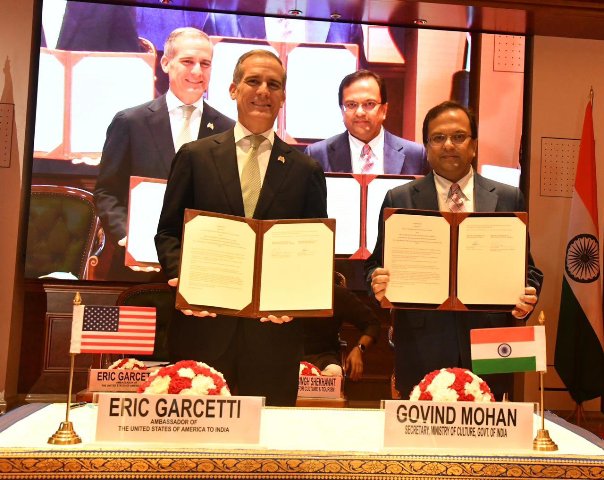On July 26, 2024, India and the United States signed a landmark 'Cultural Property Agreement' (CPA) to address and prevent the illicit trafficking of antiquities from India to the USA. The signing took place on the sidelines of the 46th World Heritage Committee session at Bharat Mandapam, New Delhi. The agreement was formalized by Shri Govind Mohan, Secretary of the Ministry of Culture, and H.E. Eric Garcetti, the U.S. Ambassador to India, with Union Minister of Culture and Tourism, Shri Gajendra Singh Shekhawat, present.
The CPA aligns with the 1970 UNESCO Convention, which aims to prohibit and prevent the illegal import, export, and transfer of ownership of cultural property. This agreement addresses a longstanding issue of cultural property trafficking, which has seen numerous Indian artifacts smuggled out before the ratification of the 1970 convention and now housed in museums and private collections worldwide.
Union Minister Gajendra Singh Shekhawat described the CPA as a pivotal step in protecting India’s rich cultural heritage and retrieving invaluable artifacts. He emphasized that the preservation of Indian artifacts has become a key component of India's foreign policy, reflecting the government's commitment under Prime Minister Narendra Modi. Since 1976, India has repatriated 358 antiquities, with 345 returned since 2014.
During India's G20 Presidency, the issue of 'Protection and Promotion of Cultural Property' was highlighted as a significant priority. The G20's "Kashi Culture Pathway" and the New Delhi Leaders’ Declaration (NDLD) in 2023 endorsed a strengthened global coalition to combat illicit cultural trafficking, marking a paradigm shift in global development strategy with a focus on culture.
The CPA, the result of extensive bilateral discussions and negotiations during the G20 Culture Working Group meetings, marks a milestone in cultural diplomacy. It underscores the importance of repatriation not just as a moral imperative but as a strategic investment in cultural diplomacy and sustainable development. Returning artifacts to their countries of origin supports cultural stewardship, tourism, and local economic growth.
Shri Shekhawat highlighted that India's Cultural Creative Economy serves as a model for leveraging heritage for global benefit. It promotes cross-cultural understanding, economic empowerment, and sustainable development. This vision aligns with the Prime Minister's ‘Vikas Bhi, Virasat Bhi’ and Viksit Bharat Vision 2047, emphasizing the role of culture in societal growth and sustainability.
Secretary Govind Mohan noted that the CPA symbolizes the strength of Indo-U.S. relations and represents a significant advance in safeguarding cultural treasures. He underscored the agreement's role in ensuring these artifacts are preserved in their rightful contexts for future generations.
The agreement comes after a successful repatriation of 262 antiquities from the U.S. to India, following Prime Minister Modi's visit to the U.S. in June 2023. Both nations are committed to further cooperation to combat illegal trafficking and protect their shared cultural heritage.











